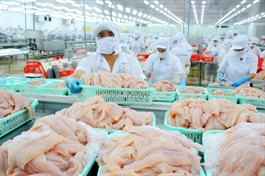Pork prices fall as VN steps up imports, demand declines
Pork prices fall as VN steps up imports, demand declines
The imported pork and declining meat consumption have pushed pork prices down, helping stabilise the consumer price index. 
This month pork has been sold at the Hoc Mon wholesale market in HCM City for around VND72,000 (US$3.17) per kilogramme, VND8,000 down from previous months, according to its management.
Le Xuan Huy, deputy general director of the CP Livestock Joint Stock Company, said hog prices are down because of increased imports of both frozen pork and live pigs as well as lower demand.
According to the Ministry of Agriculture and Rural Development, in the first seven months of this year Viet Nam imported more than 93,248 tonnes of pork, mainly from Canada, Germany, Poland, Brazil, the US, Spain, and Russia, 223 per cent up from the same period in 2019.
The ministry licensed imports of pigs on the hoof from Thailand from mid-June. As of August 36 companies registered to quarantine more than 4.7 million pigs arriving from Thailand into Viet Nam, and over 75,000 of them have been slaughtered so far.
Deputy Minister of Agriculture and Rural Development Phung Duc Tien said Viet Nam has not set a quota for imports of live pigs or meat and the Department of Animal Health always facilitates customs clearance of imports.
But importing pork has been difficult since African swine fever reduced the global pig population by 12 per cent.
Nguyen Kim Doan, vice chairman of the Dong Nai Livestock Association, said live hog prices in the south has been around VND70,000 per kilogramme over the past week, and sometimes even lower while the production cost at present is VND71,000.
Another reason for hog prices to fall was the advent of the seventh lunar month, known as Vu Lan month, on August 19, a time when many families do not eat meat for religious reasons.
“The return of COVID-19 also caused the price of pigs to fall as demand decreased.”
Nguyen Van Trong director of the ministry’s department of livestock production, said as of the end of July the country had some 25.2 million pigs, 81.9 per cent of the number before African swine fever first hit in January 2019.




























